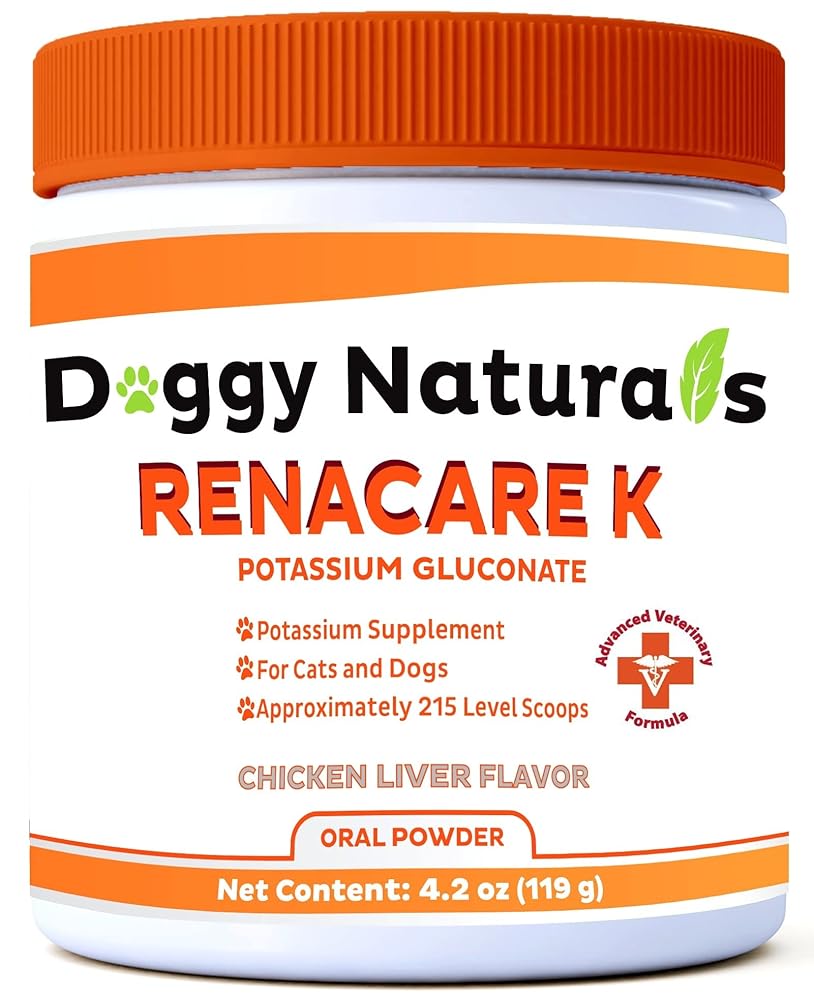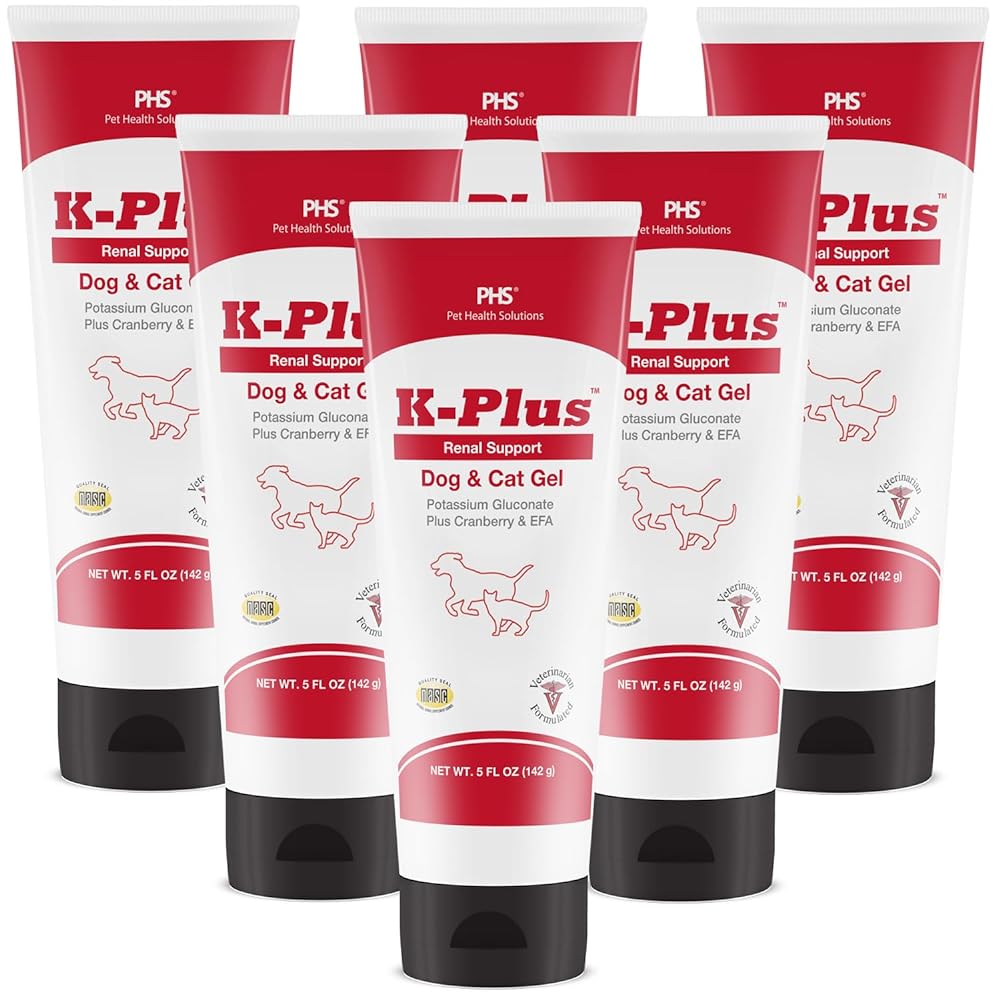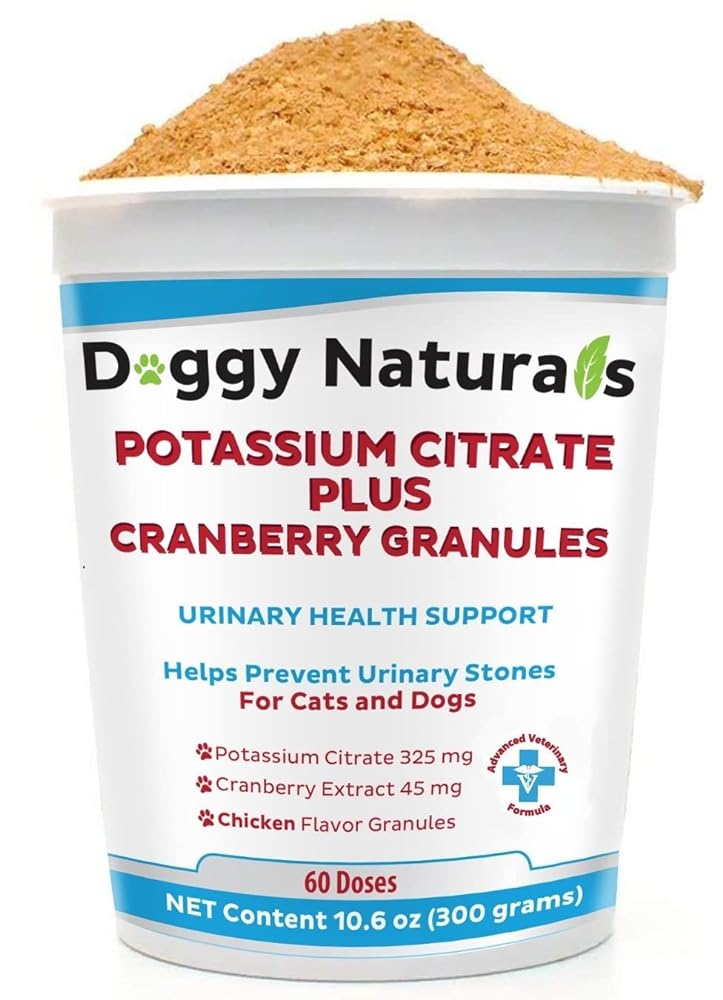iHeartCats is reader-supported. When you buy via links on our site, we may earn an affiliate commission at no extra cost to you.
Potassium is an essential mineral that plays a vital role in various physiological processes in cats, such as nerve function, muscle health, and fluid balance. While most cats get adequate potassium from their diet, certain conditions like chronic kidney disease, hyperthyroidism, or prolonged diarrhea can lead to potassium deficiency. In these cases, supplementation may become necessary. This article aims to guide you through the best potassium supplements for cats, exploring their benefits, different forms, and factors to consider when choosing the right product for your feline friend.
#1 – RenaCare K is for Renal K (Potassium Gluconate) Potassium Supplement Powder for Dogs and Cats, (4 oz) with Chicken Liver Flavor – 215 Level Scoop (Made in U.S.A)
RenaCare K is a potassium supplement powder made for dogs and cats with low potassium levels. The powder is highly palatable and supports normal renal health in pets. It can be used along with potassium diets and promotes the absorption of potassium into the bloodstream to rebalance levels and maintain overall pet health.
Best For: Pets with low potassium levels. (best overall)
#2 – K-Plus Potassium Citrate Plus Cranberry Granules for Dogs and Cats – Veterinarian Approved UTI Remedy Granules – Supports Bladder Health – 60 Doses
K-Plus Potassium Citrate Plus Cranberry Granules for Dogs and Cats is a veterinarian-approved remedy that supports bladder health and urinary tract function in pets. The granules are made with natural ingredients including potassium citrate and cranberry extract, which help maintain proper urine mineral balance, support kidney detoxification, and promote healthy waste elimination. This product is best for pets that need support with urinary tract health and kidney function.
Best For: Supporting bladder health and urinary tract function.
#3 – Vetoquinol Renal K+ (Potassium Gluconate) Potassium Supplement Gel for Dogs and Cats, 5oz
The Vetoquinol Renal K+ is a potassium supplement gel for dogs and cats that supports normal renal health. It is highly palatable and can be easily administered with its maple-flavored gel or chicken-and-fish-flavored powder. This oral supplement contains essential potassium and B-Complex vitamins to manage potassium levels in pets and is ideal for both dogs and cats that need extra kidney support and have low potassium levels.
Best For: Dogs and cats that need extra kidney support and have low potassium levels.
#4 – Rx Vitamins Amino B+K Supplement for Cats – Extra Potassium & B-Complex Vitamins – Hypoallergenic – 4 oz Highly Palatable Liquid
The Rx Vitamins Amino B+K Supplement for Cats is a highly palatable liquid supplement that can be used to provide additional potassium and B-complex vitamins to cats. It is hypoallergenic and delivers potassium gluconate and essential amino acids in a palatable format. This supplement is best for cats that require additional potassium and B-complex vitamins in their diet.
Best For: Cats in need of additional potassium and B-complex vitamins. (best ingredient sourcing)
#5 – K-Plus Potassium Gluconate Renal Gel Plus Cranberry and EPA for Dogs and Cats – Veterinarian Approved Renal Supplement – Supports Potassium Balance – 6-Pack of 5-oz, 30-oz
The K-Plus Potassium Gluconate Renal Gel Plus Cranberry and EPA is a veterinarian-approved renal supplement for dogs and cats with chronic kidney disease. It provides additional potassium to support renal function, while also containing other important nutrients such as B vitamins and amino acids. The gel is formulated to be palatable and easy to administer, promoting overall health and well-being in pets.
Best For: Dogs and cats with chronic kidney disease. (best for renal support)
#6 – Potassium Citrate Plus Cranberry Granules 300gm for Cats and Dogs – Urinary Tract Support-Helps Deter Formation of Calcium Oxalate Stones – Deters Bladder & Kidney Stones (Made in U.S.A)
Potassium Citrate Plus Cranberry Granules 300gm is a supplement for cats and dogs that supports urinary tract health and helps prevent the formation of calcium oxalate stones in the bladder. It contains high levels of potassium citrate, which binds with excess calcium and oxalates to minimize stone formation. The supplement also includes cranberry extract for additional urinary tract health benefits. It is safe for long-term use and is more affordable than expensive diets.
What Are The Benefits of a Potassium Supplement for Cats?
Potassium supplements can offer several crucial benefits for cats, particularly those dealing with conditions that lead to low potassium levels. Here are some of the main advantages:
- Muscle Health: Potassium is essential for proper muscle function. Cats with low potassium levels may suffer from muscle weakness, which can severely impact their mobility and overall well-being.
- Nerve Function: This mineral is crucial for maintaining the electrical balance needed for nerve impulse transmission. Lack of potassium can lead to neurological problems, affecting your cat’s coordination and reflexes.
- Fluid Balance: Potassium helps regulate the balance of fluids in and out of cells, tissues, and organs. Cats with conditions like chronic kidney disease often have issues with fluid balance, and potassium supplementation can help manage this.
- Heart Health: Potassium plays a role in maintaining a healthy heart rhythm. Cats with low levels of potassium are at a higher risk for developing heart-related issues.
- Improved Quality of Life: With proper supplementation, many symptoms related to potassium deficiency, such as lethargy and loss of appetite, can improve. This can make a significant difference in your cat’s activity levels and general happiness.
If your cat is suffering from a condition that leads to low potassium levels, such as chronic kidney disease, hyperthyroidism, or prolonged episodes of vomiting or diarrhea, potassium supplementation can be an essential part of the treatment plan. Always consult your veterinarian for a proper diagnosis and to determine the appropriate type and dosage of any supplements your cat may need.
Frequently Asked Questions About Potassium Supplements for Cats
1. What are potassium supplements used for in cats?
Potassium supplements are primarily used to treat low potassium levels (hypokalemia) in cats, often associated with conditions like chronic kidney disease, hyperthyroidism, or long-term diarrhea. Low potassium can lead to muscle weakness, poor appetite, and other health issues. Supplementing with potassium helps to normalize these levels and improve the cat’s overall health.
2. What are the signs of potassium deficiency in cats?
Signs of potassium deficiency may include muscle weakness, difficulty walking or standing, lethargy, poor appetite, and in severe cases, cardiac issues. If you notice any of these symptoms in your cat, consult your veterinarian for proper diagnosis and treatment.
3. How do I know if my cat needs a potassium supplement?
A veterinarian can diagnose low potassium levels through blood tests. If your cat has a condition like chronic kidney disease or symptoms like muscle weakness and lethargy, a potassium test may be part of the diagnostic process. If levels are low, your vet may recommend supplementation.
4. Are there any side effects to giving my cat potassium supplements?
While generally safe when given at the recommended dosages, excessive potassium can lead to hyperkalemia, with symptoms such as irregular heart rhythm, muscle twitching, and gastrointestinal upset. Always consult your veterinarian for appropriate dosing to avoid complications.
5. Can I give my cat human potassium supplements?
It’s crucial not to give human potassium supplements to cats without veterinary advice. Human supplements may contain higher doses or additional ingredients that are not safe for feline consumption. Always use supplements formulated specifically for cats.
6. What are the different forms of potassium supplements available for cats?
Potassium supplements for cats are commonly available in various forms like gel, powder, or oral tablets. The choice depends on your cat’s preferences and your ease of administration. Consult your veterinarian for the most suitable form for your pet.
7. How long will my cat need to take potassium supplements?
The duration of potassium supplementation depends on the underlying cause of the deficiency and how well your cat responds to treatment. Conditions like chronic kidney disease may require long-term supplementation, while other conditions might resolve more quickly.
8. Should I adjust my cat’s diet when giving potassium supplements?
While a balanced diet is crucial, some medical conditions might require specific dietary adjustments along with potassium supplementation. Always consult your veterinarian for a tailored dietary plan suitable for your cat’s individual needs.
9. Can kittens take potassium supplements?
While it’s less common for kittens to need potassium supplements, they might require them under certain medical circumstances. Always consult a veterinarian for proper diagnosis and appropriate dosing for kittens.
10. Can I give my cat potassium supplements without a veterinary consultation?
It’s not advisable to give your cat any supplements, including potassium, without consulting a veterinarian. Incorrect dosing can lead to complications like hyperkalemia. A veterinary consultation ensures that the supplement is necessary, safe, and given at the appropriate dose for your cat.
Conclusion: Best Potassium Supplements for Cats
Choosing the best potassium supplement is a critical aspect of managing your cat’s health, especially when dealing with specific medical conditions that can cause potassium loss. It’s essential to consult with your veterinarian to diagnose the underlying issue and to tailor the supplement regimen to your cat’s specific needs. With the proper guidance and selection, potassium supplements can effectively help restore this crucial mineral, thereby improving your cat’s overall well-being and quality of life.






